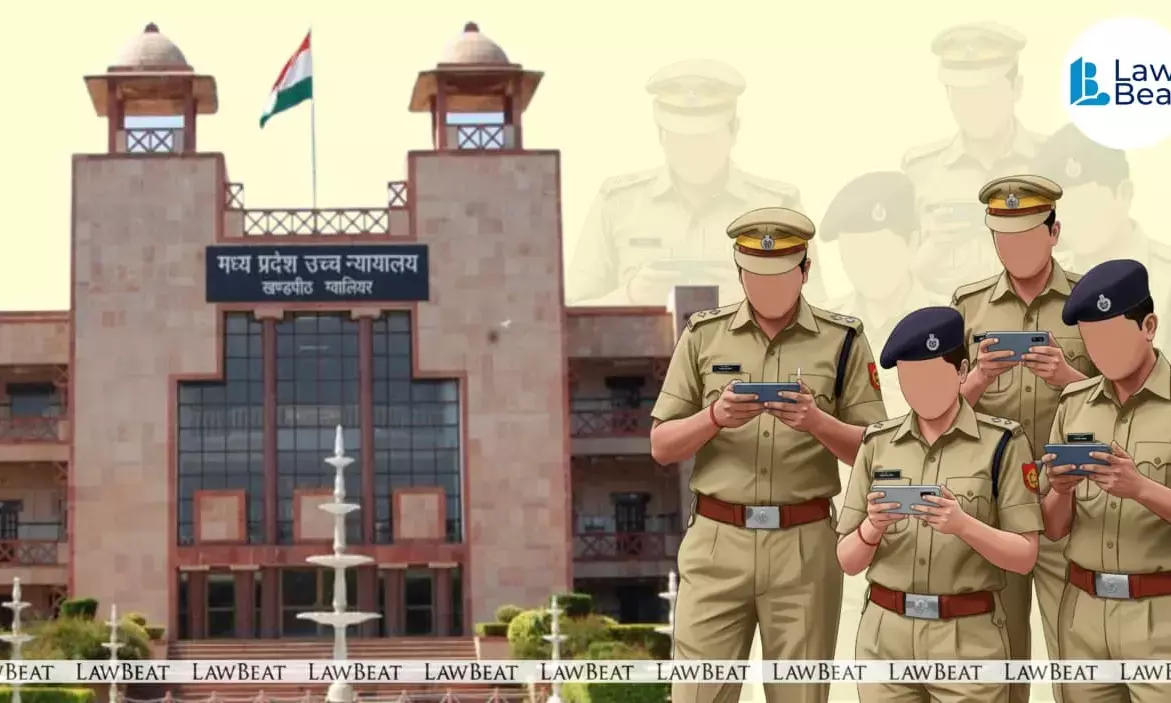From Alcohol to Mobile Addiction: Madhya Pradesh HC on Threats to Police Discipline

The Madhya Pradesh High Court upholds police constable's compulsory retirement over misconduct on guard duty
The Madhya Pradesh High Court recently upheld the compulsory retirement of a police constable accused of sleeping under the influence of alcohol while on guard duty, stating that such misconduct in the police force cannot be taken lightly.
A division bench comprising Justice Anand Pathak and Justice Pushpendra Yadav dismissed the writ appeal filed by constable Ashok Kumar Tripathi, who had challenged the disciplinary action and subsequent orders upholding his punishment.
In 2007, Tripathi was posted on guard duty at an army bungalow in Gwalior. On the morning of August 4 that year, he was found asleep and allegedly intoxicated. A departmental inquiry followed, in which a medical officer testified that his breath smelled of liquor. Based on this finding, the Commandant of the 5th Battalion, Special Armed Force (SAF), Morena, imposed the penalty of compulsory retirement on December 31, 2007. His appeals before the Deputy Inspector General of SAF and later before the Director General of Police were both dismissed in 2008 and 2011, respectively.
Tripathi had earlier approached the High Court in 2012, but his writ petition was dismissed by a single judge in April 2025. He then filed a writ appeal before the division bench.
Arguing for Tripathi, counsel submitted that no proper medical examination or breath test was conducted to confirm intoxication. The doctor had merely noted an odour of liquor but simultaneously declared Tripathi fit for duty. It was further argued that the writ court failed to consider this contradiction and dismissed the petition without a proper evaluation of evidence. The counsel contended that the punishment was disproportionate and deserved reconsideration.
The State, however, stressed that a member of the police force, particularly on guard duty, is expected to maintain vigilance and discipline. Falling asleep under the influence of alcohol was not only a breach of duty but also a threat to public safety. Counsel for the State further pointed out that this was not the constable’s first instance of misconduct; he had earlier been punished in April 2007 for remaining absent on duty, where one increment was stopped with cumulative effect.
The bench observed that misconduct in a disciplined force, especially when linked to intoxication, could have serious consequences for law and order.
“An employee, that too in the police department, if performs duties while in an inebriated condition, is a recipe for law and order problems,” the court remarked.
It noted that the scope of judicial review in departmental inquiries was limited, and interference was warranted only when the punishment was shockingly disproportionate or procedurally flawed. In this case, the punishment of compulsory retirement was neither excessive nor unreasonable.
"Petitioner was the member of guard duty at the residence of a Protectee, therefore, he was required to be more vigilant for the purpose he was deputed and this intoxication may breed indiscipline and may cause accident/mishap at the hands of guard himself who is meant to protect the person for whose security he is deputed as guard," court said.
Interestingly, before closing the judgment, the court expanded its observations to modern challenges facing the police force. It drew attention to what it termed the “intoxication of mobile and social media,” cautioning that many police personnel were seen distracted by their phones even while on sensitive duties such as court security, law-and-order assignments, or bungalow guard duties.
Such distractions, the judges warned, compromised discipline and in some cases exposed policemen to harmful or incriminating content online.
"This creates indiscipline, casualness in duties and at times incriminating Social Media clips, pollutes the mind and affects disposition of policeman. This issue deserves attention of Senior Police Officers and remedial measures as well," court said.
Court suggested that the police department incorporate sensitization programmes in training centres for constables and officers, focusing on responsible use of mobile phones during duty.
It further advised senior officers to devise mechanisms for stricter supervision of personnel and to check their engagement with social media while on duty.
Court ordered the copies of the order to be sent to the Director General of Police and other senior officials for consideration of reforms.
Case Title: Ashok Kumar Tripathi vs. State of Madhya Pradesh & Ors
Order Date: September 11, 2025
Bench: Justice Anand Pathak and Justice Pushpendra Yadav
